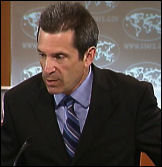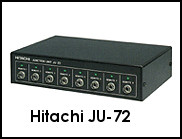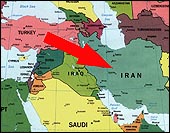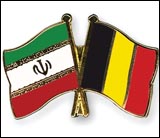 ABOVE: Mark C. Toner
ABOVE: Mark C. Toner
The State and Treasury Departments announced today new Iranian sanctions against Iran’s Islamic Revolutionary Guard Corps, the Basij Resistance Force, and Iran’s national police and its chief. These sanctions, which would block all assets in the United States held by these groups, arise from human rights’ abuses by Iran committed by these groups.
State Department Deputy Spokesperson Mark C. Toner was discussing these sanctions in today’s Daily Press Briefing when an astute reporter asked the obvious question: do these entities have any assets that will be blocked by these sanctions. I mean, really, does anyone actually think that the Islamic Revolutionary Guard, the Iranian police or their chief have any assets in the United States?
The interchange between Toner and the reporter is both amusing and instructive as Toner tries, not so deftly, to dodge the question:
QUESTION: I have two questions about the sanctions announcements that were made this morning jointly with Treasury. One, can you tell us to what extent, if at all, any of the three designated entities or the one designated individual have assets that fall under U.S. jurisdiction?
MR. TONER: I do not know that. I believe, as you said, that this action will block or freeze property and interest in property for designated persons or designated entities, and U.S. persons are prohibited from engaging in transactions involving the persons and entities.
QUESTION: (Sneeze.)
MR. TONER: God bless you. But I can’t give you a breakdown of what assets may be affected by that.
QUESTION: Can you check for us to see if the Departments of State or Treasury believe that these entities and the individual have any assets or any significant assets that would be captured or frozen by this? And if not, what is the significance of that –
MR. TONER: Well –
QUESTION: Wait. Let me finish.
MR. TONER: Okay.
QUESTION: What is the significance of it? In the past, you have sometimes argued that – or U.S. officials have sometimes argued that there is a multiplier effect because other financial institutions will steer clear of such entities or individuals for fear of falling afoul.
MR. TONER: That’s a good answer.
QUESTION: I know it is, and I understand this, but I’d really much rather have it out of a U.S. official than me, so if you can check.
MR. TONER: Well, certainly, Arshad. But I mean this – I – as I said, I can’t give you a clear breakdown and I would refer you to –
QUESTION: I didn’t ask for a breakdown. I asked for whether you have – they have any assets or any significant assets. I’m not asking for a breakdown. I’m asking, do they have any assets or significant assets?
MR. TONER: Okay. And I will endeavor to get that for you.
QUESTION: Thanks.
MR. TONER: But again, what’s important here is the bite, if you will, of these sanctions is only one element. It also sends a clear message that we won’t abide by Iran’s continued human rights abuses.
Yes, he really did say that the bark may be worse than the bite.
 According to this Law360 post (subscription required), James Larrison, a former employee of Aegis Electronic Group, was sentenced to probation for his role in the company’s export of an EAR99 Hitachi JU72 video camera junction to Iran. Larrison pleaded guilty to the export violation in December 2009. In April 2011, Aegis entered into a deferred prosecution agreement and agreed to pay a $20,000 fine to the Office of Foreign Assets Control (“OFAC”) in connection with this export.
According to this Law360 post (subscription required), James Larrison, a former employee of Aegis Electronic Group, was sentenced to probation for his role in the company’s export of an EAR99 Hitachi JU72 video camera junction to Iran. Larrison pleaded guilty to the export violation in December 2009. In April 2011, Aegis entered into a deferred prosecution agreement and agreed to pay a $20,000 fine to the Office of Foreign Assets Control (“OFAC”) in connection with this export.
 Posted by
Posted by  Category:
Category: 

 Although the UAE is still probably the most significant country involved in the transshipment of U.S. origin goods to Iran, the Iranian procurement network is extending to other countries as well. A recent
Although the UAE is still probably the most significant country involved in the transshipment of U.S. origin goods to Iran, the Iranian procurement network is extending to other countries as well. A recent 
 A superseding
A superseding

